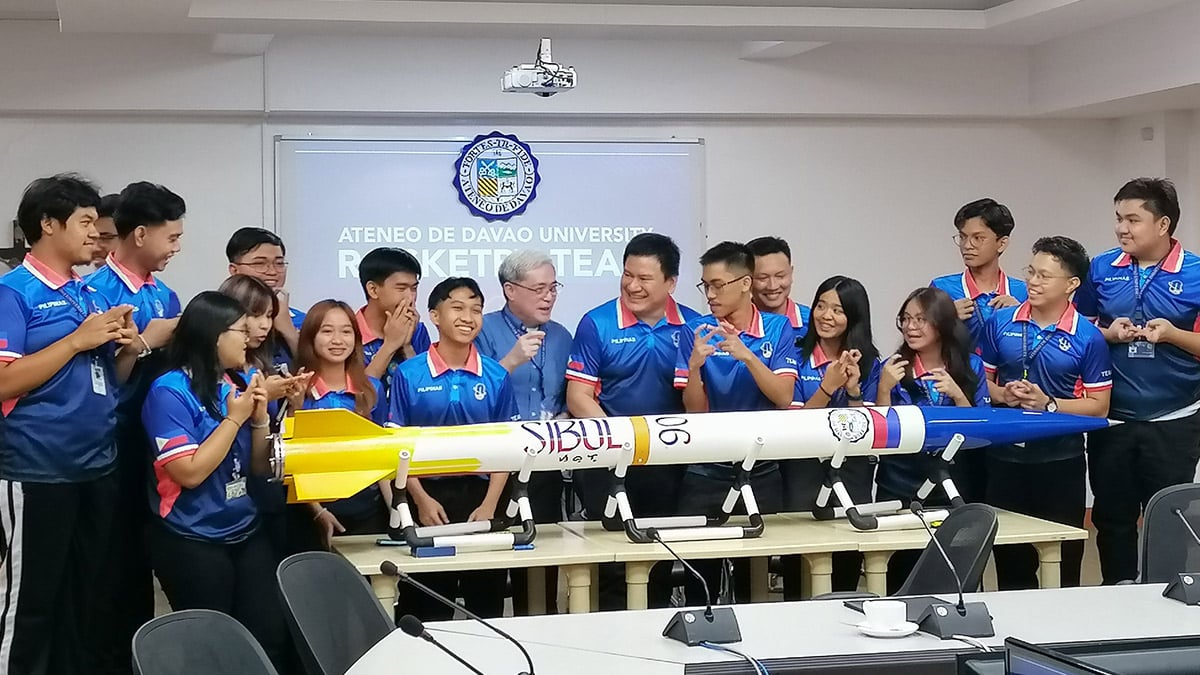Ateneo de Davao team makes successful rocket launch in US Spaceport Cup

HISTORY MADE The Ateneo de Davao University Rocketry Team, shown in this June 10 photo, is the first Philippine team to compete in the 2024 Spaceport America Cup in NewMexico, United States, the world’s largest intercollegiate rocket engineering competition. —Joselle R. Badillarocket
DAVAO CITY—A rocketry team composed of aerospace engineering students from Ateneo de Davao University (AdDU) successfully launched rocket “Sibol” at the Spaceport America Cup, the world’s largest student rocketry competition held in New Mexico, United States, on June 22.
Fr. Karel San Juan, S.J., AdDU president, showed the video of the launch to more than 1,300 graduates and their parents during the commencement exercise here on Saturday.
“This is AdDU’s humble contribution to the development of space technology, which is crucial in our pursuit of sustainable development goals,” San Juan said.
READ: Filipino students to compete in Spaceport America Cup in New Mexico
The team’s hybrid rocket, Sibol, a 9.7-foot high-powered rocket carrying an 8.8-pound payload (4 kilograms) to an altitude of 3,048 meters (10,000 feet), competed in the solid propulsion (solid propellant) 10,000 commercially off-the-shelf category.
It was the last rocket launched on the third day of the competition, according to Dr. Rogel Mari Sese, chair of the AdDU aerospace department, who was with the team of 16 aerospace engineering students and advisers that included Engr. Ramon Gregorio III and Wilfredo Pardorla Jr., who are part of the university’s aerospace engineering program.
First from PH
The AdDU team is the first to represent the Philippines in the Intercollegiate Rocket Engineering Competition, dubbed as the world’s biggest student rocket engineering competition, which ran from June 17 to June 22 this year in New Mexico, and was attended by about 1,700 students from 200 different universities from the United States and 20 other countries.
Of the 152 teams that registered, 86 were from the United States and 66 from foreign countries, including the Philippines, India, Taiwan and Thailand.
The aerospace students developed the prototype of their rocket in about a year, said Sese. After hurdling through rigorous flight readiness tests, it eventually earned them a spot in the tilt.
He said the Philippine rocket was recovered safely from the field immediately after the launch.
The launch came six years after AdDU started offering BS Aerospace Engineering here in the school year 2018-2019.
According to San Juan, the university’s rocketry team is a crucial part of AdDU’s larger rocket development program, Project Sugod (Cebuano term for start), which seeks to advance aerospace engineering in the country.
“Through this initiative, we aim to not just compete in future Spaceport America Cup competitions but also inspire and nurture a new generation of Filipino engineers and scientists, positioning our country as a burgeoning hub for aerospace innovation,” San Juan told a media launch on June 10.
Rockets bring satellites into space, said Sese, as quoted by Atenews, the AdDU’s official school publication, during the event.
Sese cited the numerous uses of satellites from broadcasting news, accessing the internet and navigating with the use of global positioning systems, taking images from space, and seeing weather forecasts, among others. “Our own Philippine satellites can help monitor the health of crops and optimize fertilizer use; keep track of the concentration of greenhouse gases in the atmosphere; observe ocean behavior … Satellites can also help us monitor typhoons and other extreme weather events,” he said.
“The launch is a victory for Filipinos who aim for excellence and innovation in space technology,” said Franz Carlo Guevara, who led the rocketry team of 16 students that also included Azaella Beatriz Amposta and Ryve Caasi, flight operations lead; Mariz Aylah Cenojas, Dylan Ruth Mayled and Avery Clyde Dimasuhid, structures lead; Franz Joseph Tinapay and Mary Nicole Jacinto, propulsion; Angelo Ryan Dolina and John Vincent Manog for avionics and payload; Cai Roxana Reyes and Neil Andrie Paye for recovery and safety; Ryle Radinka Gere, Nhorman Carl Baluran, Jose Kelvin Juson and Lenwen Kirk Cacho for logistics and documentation.














